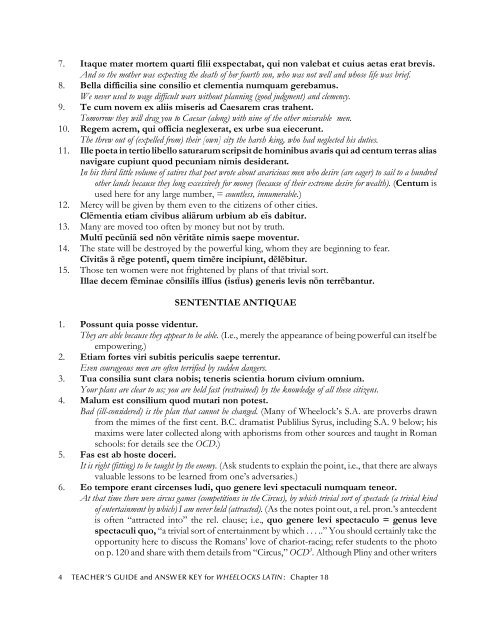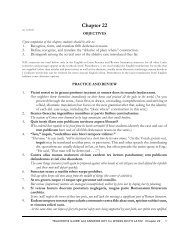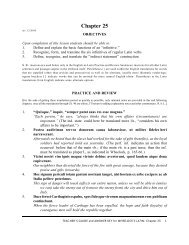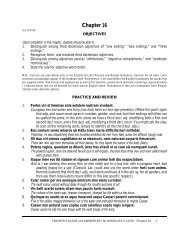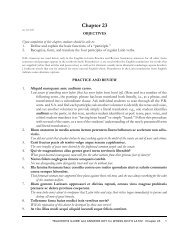Chapter 18
Chapter 18
Chapter 18
Create successful ePaper yourself
Turn your PDF publications into a flip-book with our unique Google optimized e-Paper software.
7. Itaque mater mortem quarti filii exspectabat, qui non valebat et cuius aetas erat brevis.<br />
And so the mother was expecting the death of her fourth son, who was not well and whose life was brief.<br />
8. Bella difficilia sine consilio et clementia numquam gerebamus.<br />
We never used to wage difficult wars without planning (good judgment) and clemency.<br />
9. Te cum novem ex aliis miseris ad Caesarem cras trahent.<br />
Tomorrow they will drag you to Caesar (along) with nine of the other miserable men.<br />
10. Regem acrem, qui officia neglexerat, ex urbe sua eiecerunt.<br />
The threw out of (expelled from) their [own] city the harsh king, who had neglected his duties.<br />
11. Ille poeta in tertio libello saturarum scripsit de hominibus avaris qui ad centum terras alias<br />
navigare cupiunt quod pecuniam nimis desiderant.<br />
In his third little volume of satires that poet wrote about avaricious men who desire (are eager) to sail to a hundred<br />
other lands because they long excessively for money (because of their extreme desire for wealth). (Centum is<br />
used here for any large number, = countless, innumerable.)<br />
12. Mercy will be given by them even to the citizens of other cities.<br />
Cl�mentia etiam c�vibus ali�rum urbium ab e�s dabitur.<br />
13. Many are moved too often by money but not by truth.<br />
Mult� pec�ni� sed n�n v�rit�te nimis saepe moventur.<br />
14. The state will be destroyed by the powerful king, whom they are beginning to fear.<br />
C�vit�s � r�ge potent�, quem tim�re incipiunt, d�l�bitur.<br />
15. Those ten women were not frightened by plans of that trivial sort.<br />
Illae decem f�minae c�nsili�s ill�us (ist�us) generis levis n�n terr�bantur.<br />
SENTENTIAE ANTIQUAE<br />
1. Possunt quia posse videntur.<br />
They are able because they appear to be able. (I.e., merely the appearance of being powerful can itself be<br />
empowering.)<br />
2. Etiam fortes viri subitis periculis saepe terrentur.<br />
Even courageous men are often terrified by sudden dangers.<br />
3. Tua consilia sunt clara nobis; teneris scientia horum civium omnium.<br />
Your plans are clear to us; you are held fast (restrained) by the knowledge of all these citizens.<br />
4. Malum est consilium quod mutari non potest.<br />
Bad (ill-considered) is the plan that cannot be changed. (Many of Wheelock’s S.A. are proverbs drawn<br />
from the mimes of the first cent. B.C. dramatist Publilius Syrus, including S.A. 9 below; his<br />
maxims were later collected along with aphorisms from other sources and taught in Roman<br />
schools: for details see the OCD.)<br />
5. Fas est ab hoste doceri.<br />
It is right (fitting) to be taught by the enemy. (Ask students to explain the point, i.e., that there are always<br />
valuable lessons to be learned from one’s adversaries.)<br />
6. Eo tempore erant circenses ludi, quo genere levi spectaculi numquam teneor.<br />
At that time there were circus games (competitions in the Circus), by which trivial sort of spectacle (a trivial kind<br />
of entertainment by which) I am never held (attracted). (As the notes point out, a rel. pron.’s antecdent<br />
is often “attracted into” the rel. clause; i.e., quo genere levi spectaculo = genus leve<br />
spectaculi quo, “a trivial sort of entertainment by which . . . ..” You should certainly take the<br />
opportunity here to discuss the Romans’ love of chariot-racing; refer students to the photo<br />
on p. 120 and share with them details from “Circus,” OCD 3 . Although Pliny and other writers<br />
4 TEACHER’S GUIDE and ANSWER KEY for WHEELOCKS LATIN: <strong>Chapter</strong> <strong>18</strong>


